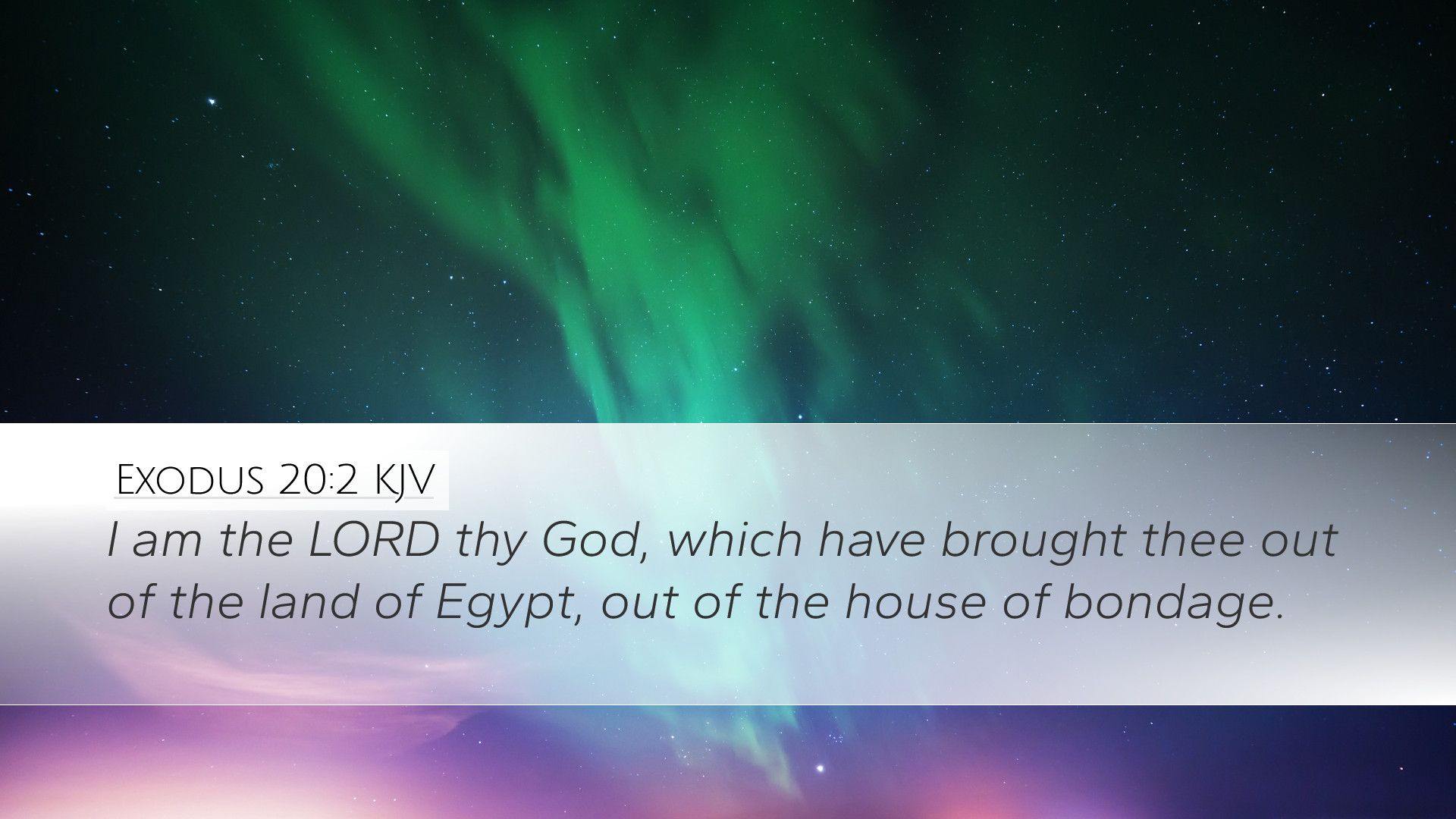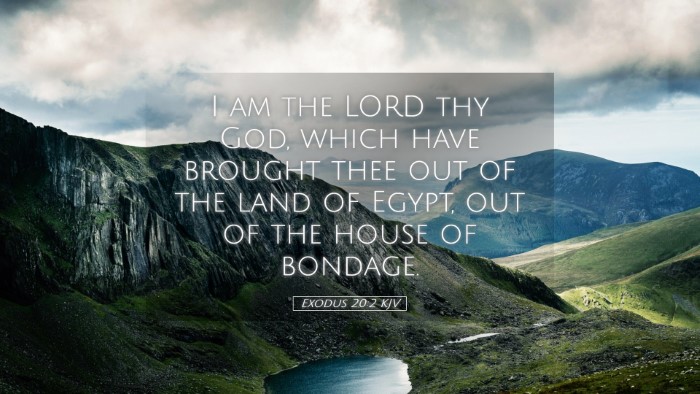Exodus 20:2 - Commentary and Insights
Verse Text: “I am the Lord your God, who brought you out of the land of Egypt, out of the house of bondage.”
Contextual Introduction
The second verse of Exodus 20 serves as a preamble to the Ten Commandments, emphasizing God's authority and His relationship with the Israelites. This seminal verse encapsulates divine deliverance and sets the stage for the moral and ethical guidelines that follow.
Significance of the Divine Declaration
Matthew Henry: This statement opens the Decalogue with a powerful declaration of God’s sovereignty. It reminds the people that their identity and law are founded upon a relationship with the divine. Henry emphasizes that recognizing God’s lordship is essential to understanding the following commands.
Albert Barnes: Barnes elaborates on the importance of the phrase "I am the Lord your God.” It reveals God's initiative in the covenant relationship, signifying that the commandments that follow are not arbitrary rules imposed upon them but rather a response to their deliverance. This divinely initiated relationship serves as the foundation of moral obligation for the community.
The Nature of God's Lordship
Adam Clarke: Clarke provides a detailed consideration of the implications of God being their Lord. He points out that this lordship is not merely a title but is grounded in action—God's act of salvation. The act of bringing Israel out of Egypt was a demonstration of His power and faithfulness and establishes the authority He possesses to reign over them as their God.
Spiritual Implications: This understanding of God’s lordship informs believers about the nature of their own lives. It emphasizes that loyalty and adherence to God’s commands stem from acknowledgment of His sovereign right over their lives and circumstances.
The Exodus as a Historical Framework
The historical act of deliverance from Egypt carries significant theological weight. Matthew Henry notes that the Israelites were once enslaved, experiencing not only physical oppression but spiritual bondage. God’s deliverance was not just liberation from physical captivity; it set a precedent for spiritual freedom.
Albert Barnes mentions that this moment in history illustrates that the God who saves is also the authority whom we must obey. He emphasizes that the recognition of God’s salvation power is intrinsically linked to His right to command. The foundational act of God drawing His people out of bondage is a call to grateful obedience.
The Commandments as a Response to Deliverance
Understanding the commandments as a response to God's saving grace is vital. Adam Clarke asserts that God's commandments are rooted in his character and represent His will for holy living. The directive to "have no other gods" follows logically from the acknowledgment of God’s authority as the deliverer.
- Holistic Application: By framing the Ten Commandments within the context of redemption, believers recognize that obedience is not burdensome but a natural response to grace.
- Moral Framework: This understanding aids pastors and theologians in conveying the grace-led nature of Christian ethics, steering away from legalism.
Identity as God's People
Exodus 20:2 also speaks to identity. Matthew Henry emphasizes that God identifies Himself as the God of the Israelites, which establishes their identity as His chosen people. This identity is founded not upon their merit but on His grace and faithfulness.
Albert Barnes suggests that this identity serves as a reminder of privilege and responsibility. Being chosen implies a calling to live in accordance with God’s character and commands. It establishes a covenantal relationship where obedience to God's laws reflects His nature in the world.
Theological Reflections
This verse invites deep reflection on the nature of God and His people. Adam Clarke notes that this declaration brings forth essential themes of God’s nature—His sovereignty, deliverance, and covenant faithfulness. Understanding these attributes enables believers to engage with the commandments not merely as rules but as transformative guidelines that shape their identity and communal life.
- God’s Sovereignty: The acknowledgment of God as the sovereign Lord prompts humility and resulting submission.
- Divine Deliverance: Reflecting on God's past deliverance encourages faith in His ongoing work and providence in believers' lives.
- Covenantal Relationship: Recognizing the relational aspect of God’s commands fosters a deeper sense of belonging and responsibility among believers.
Conclusion and Practical Application
Exodus 20:2 fundamentally defines the believer's relationship to God and His commandments. Pastors, students, and theologians are reminded that this verse encompasses the essence of Christian living—rooted in a personal relationship with God, responding to His grace, and living out His commandments as an overflow of gratitude and identity.
In modern applications, it calls for reflection on our own “exoduses”—the ways God has delivered us from sin and bondage—and challenges us to live in obedience as a testimony of His glory and faithfulness. The command of God is not a burden but a beautiful guideline for those whose lives have been touched by His redeeming power.


